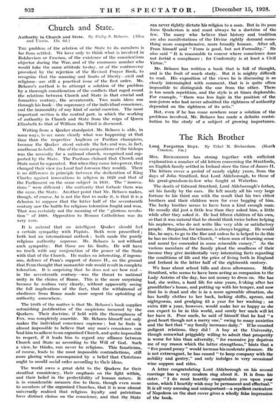The Rich Brother
MRS. RICHARDSON has strung together with sufficient explanation a number of old letters concerning the Stratfords, an English family settled in Ireland since the time of James The letters cover a period of nearly eighty years, from the days of John Stratford, first Lord Aldeborough, to those of his great-grandson-in-law who fought at Waterloo.
The death of Edward Stratford, Lord Aldeborough's father, set his family by the ears. He left nearly all his very large fortune to his third son with the result that his two eldest brothers and their children were for ever begging of him. The lucky brother seems to have been a kind enough man: He usually did just a little less than they asked him, a little while after they asked it. He had fifteen children of his own, so that it was natural that he should think twice before helping his nephews, who do not write like very able or satisfactory people. Benjamin, for instance, is always begging. He would like, he says, to go to the Bar and unless he is helped to do this he has no choice but the Church, " where men of learning sense and moral lye concealed in some miserable curacy." As the various members of the family plead the smallness of their income they give incidentally very interesting facts regarding the conditions of life and the price of living both in England and Ireland in the latter half of the eighteenth century.
We hear about school bills and dress allowances. Molly Stratford, who seems to have been acting as companion to, the Lady Antrim of the day, has not money to dress on. She has had, she writes, a hard life for nine years, lc-oking after her grandfather's house, and putting up with his temper, and now that he is dead and sheds in a more agreeable situation, she has hardly clothes to her back, lacking shifts, aprons, and nightgowns, and grudging £3 a year for her washing ; an extra £20 a year, however, would make her as happy as she can expect to be in this world, and surely her uncle will let her have it. Poor uncle, he said of himself that he had " a good heart though not a merry one," owing to many anxieties and the fact that " my family increases daily." If he counted indigent relations, they did ! A boy at the University, though somewhat priggishly willing to admit that prosperity is worse for him than adversity, " for excPssive joy deprives me of my reason which the latter strengthens," hints that a " five pound poney " would increase his moderate pleasure. He is not extravagant, he has ceased " to keep company with the nobility and gentry," and only indulges in very occasional wine suppers and rides.
A letter congratulating Lord Aldeborough on his second marriage has a very modern ring about it. It is from his sister. " I do most heartily congratulate you upon your union, which I heartily wish may be permanent and effectual." It is all very amusing, and unimportant—a repellent caricature of Napoleon on the dust cover gives a wholly false impression of the book.








































 Previous page
Previous page